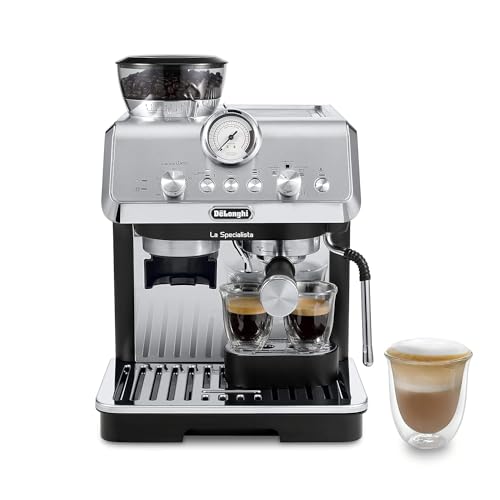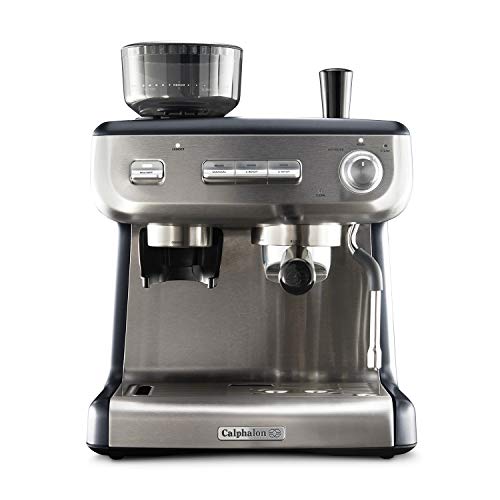If you love espresso and are a serious coffee drinker, an espresso machine might be for you. An espresso maker can cost hundreds or even thousands of dollars. Many of the best machines are in coffee houses and restaurants, while many people have more affordable espresso machines at home.
Espresso makers are expensive because they cost a lot to make. A lot of research needs to be completed by the manufacturer to get it right. Look at all of the machine's attributes before committing to a specific model.
When looking at an espresso machine, try to weigh the advantages against the cost. Espresso machines can turn out to be a convenient way to eliminate the expense of going to the coffee shop every morning. Read this article and find out why espresso machines are so expensive.
In This Guide...
Here is Why Espresso Machines are So Expensive?
Espresso is a robust and intense type of coffee that comes in small shots. It is the basis for numerous coffee drinks, such as lattes and other specialty drinks. Espresso is made by pushing pressurized hot water through delicately ground coffee beans.
Espresso comes from the same bean as coffee, but it is much stronger. An espresso machine is specifically designed to make espresso drinks. Espresso machines are more high-priced than regular coffee machines. The following include the reasons why they are more expensive:
Research to Make the Best Machine Possible
There is a lot of investigation involved in the creation of a quality espresso machine. The company that makes the espresso machine needs to know what kind of machine is in the most demand and the capabilities of that type of espresso maker.
With espresso machines, there are many factors to consider. For example, water temperature directly influences the quality of espresso that comes out of the device. Espresso machines keep the temperature of the water high and within a specific range.
Temperature control is just one variable to be considered when developing an espresso machine. It takes a lot of knowledge, research, and effort to make the machine work properly.
High-Quality Materials are Costly
The best materials for an espresso machine to be made include stainless steel, brass, or another non-corrosive material. These materials maintain the brewing process and keep it even. The high cost of these materials means a high cost for the purchase of the machine.
Espresso machines rely on the strength of their parts to make the machines. These specialized parts are necessary to pressurize and projectile the water to create a potent beverage.
Sometimes manufacturers utilize lower-cost materials to make the machine. This lower cost typically results in an espresso machine that is lower in quality.
Lower Demand Drives up The Price
Espresso machines are typically only found in café's where they depend on specialty drinks to make their money. However, few will spend the high cost of having their very own espresso machine.
The low demand for these machines results in fewer options and less competition, which drives the machine's price up. However, if you purchase the machine from a popular brand, it can be more expensive.
Additional Features Drive up The Cost
The more expensive espresso machines often come with features that can bring up the cost of the device. The goal of these features is to make the brewing process more straightforward. Some of these features include:
- Adjustable Brewing Temperature
- Pressure Control
- Digital Display to adjust settings
You can even get an espresso machine that grinds the beans or one that has a steam wand or nozzle for the milk so that you can make your very own latte.
What Types of Espresso Machines Can I Buy?
The best espresso machines require little or no effort on your part. You want your espresso machine to be as simple as possible to make a great drink. Below are the types of espresso machines that are available for use.
Lever Espresso Machine
This item was the first type of espresso machine ever made. You will typically find this espresso machine in coffee places and restaurants. With this machine, you will want a good barista with the confidence to operate the lever successfully, which helps make the perfect espresso drink.
Pump Espresso Machine
This machine employs an electric pump to get the hot water through the coffee grounds. There are different types of pump espresso machines. These include:
- Automatic
- Semi-Automatic
- Super Automatic
Pump machines are thought to be better than steam pumps. Pump machines can produce up to 15 bars of pressure. For more information on bars watch this video
Steam Espresso Machines
This machine applies steam pressure to push water through ground coffee. It is the least expensive type of espresso maker; however, it does not work as well as the others. The steam is usually around a paltry 3 bars, which is hardly anything compared to the pump machine.
Automatic and Semi-Automatic Espresso Machines
This machine operates with very little assistance from you. It is only a matter of pressing a button. With automatic machines, you do not need to contribute to the process in any way. In the semi-automatic machine, you must grind the beans and attach a filter, and then the process ensues.
Super Automatic Espresso Machine
The super-automatic machine is the most straightforward and most innovative espresso machine you can use. It does the grinding of the beans and facilitates the entire brewing process on its own.
What is the Best Home Espresso Machine?
There are so many espresso machines to choose from, and it depends upon what you want the system to do. See the chart for a sampling of available devices at different price points. This list barely scratches the surface of available designs.
De'Longhi seems to be the most prevalent machine, with all the bells and whistles for the higher-priced models down to more simplified versions.
As you can see, the old standby, Bialetti Moka, was added. This pot is the tried-and-true stovetop espresso maker. You would need to purchase a steamer for this one, and it does not grind the beans. However, old fashioned, it is still around so it must make great espresso.
How Long Does an Espresso Machine Last?
A good espresso machine should last about 20 years. It would last for a long time if the machine were made with high-quality parts. Espresso machines that are made with less expensive parts will typically only last for 5 to 10 years.
The amount of time your espresso machine will last depends on how well you take care of it and how often you use it. The type of machine that it is will also influence whether it will last long.
Finding an Espresso Machine in Your Price Range
Manual espresso machines are not as expensive as automatic ones. When you buy an automatic espresso machine, you are paying for the convenience to put in minimal effort, and the machine does most or all of the work.
It takes a lot of precision to create an espresso machine, and if there are unique features, that can undoubtedly drive up the cost. You should also keep in mind that it will likely last longer if the machine is top quality.
When searching for the perfect espresso maker, you should keep in mind that you get what you pay for. If you want a great-tasting latte, it might be worth the cost.





